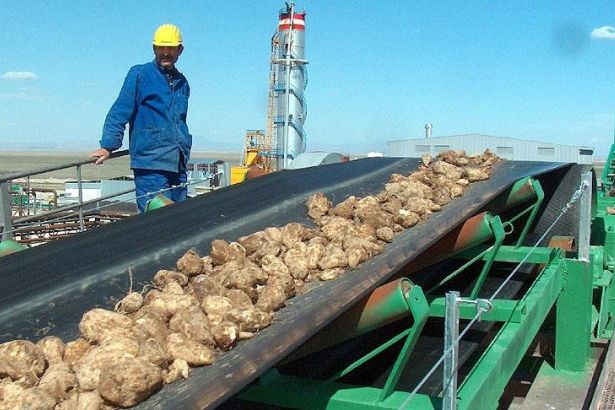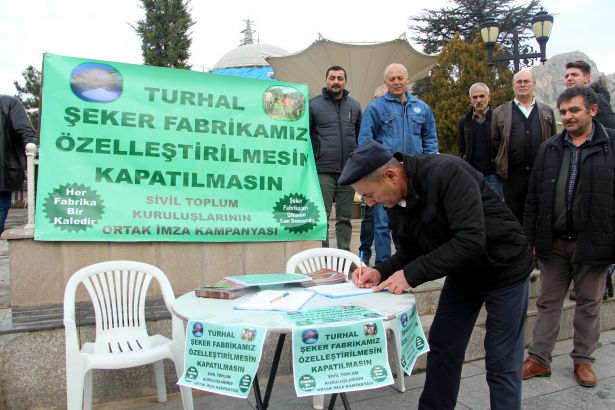Turkish sugar workers against privatisation

Turkey's Prime Minister Binali Yıldırım has announced on February 27 that the ruling Justice and Development Party (AKP) government will not step back in the privatization process of 14 sugar factories around the country.
Founded in 1926 following the establishment of the Republic of Turkey, the state-run sugar factories have served for meeting the sugar demands of citizens. However, the AKP government has decided to privatize sugar factories within the “New Medium-term Program” which covers the years between 2018-2020. The privatization was officially announced on Feb. 21 in the Official Gazette.
SUGAR WORKER: "THEY WILL STEAL MY BREAD"
soL News talked with sugar workers from the factories to be privatized. "I’ve been working at the sugar factory for 25 years and they’ve told me, 'We'll give you $40 thousand for compensation and you'll be retired'. I’m 46 and I’ve 2 more years until my retirement. They’re stealing my job. They’re stealing my bread," said a worker from the sugar factory in the city of Turhal.

"I've neither a house nor a car. I would say hello to unemployment with $40 thousand they'll give me. Considering my rents, bills and basic needs, I'll just have $20 thousand in two years. What could I do with this money? I won’t be able to buy a house," the privatization victim worker added.
AMERICAN CARGILL CORPORATION AND CARCINOGENIC SUGAR PRODUCTION
Talking about starch-based sugar production, the worker indicated to the role of American global corporation Cargill which is a partner of Turkish Ülker company, to which the wife of President Recep Tayyip Erdoğan is a partner.
The sugar worker said that the production of chemical sweeteners has increased in recent years, which leads to carcinogenic contents, adding that this process, in turn, paves the way for super-profits of pharmaceutical companies in defiance of public health.
Underlining that the Turhal sugar company makes profit $3,1 million every year, the sugar worker told soL that the factory meets half of the electricity need of Turhal city. The worker added that the trade union in sugar sector does not carry out any serious work but builds hotels with the workers' dues.
"They are collecting signatures. They will submit the signatures to the ministry. So what? Would the ministry defend you? To me, the trade union seems afraid. This cannot be solved with signatures because they [the government] has declared war to us," the worker yelled angrily, adding that they could win this fight if the people support the sugar workers.
Another worker from the Çorum sugar factory told soL that they do not want the selling of their factories as they see these workplaces as the public gaining of the Republican era in Turkey. A worker said that the factory makes profit $52,5 million every year, adding that they will be unemployed or their salaries will be cut after the factory is privatized.
The workers stated that occupational murders were witnessed and some of their colleagues lost their lives at some factories because 300 workers did such large amount of works that should have been done by 600 workers.
PRIVATISATION OF SUGAR SECTOR IS YET ANOTHER BLOW
The privatisation of sugar factories will determine Turkey's policy on sugar sector which has essential importance in the Turkish economy. Moreover, workers of sugar factories and farmers who produce sugar beet follow the developments with deep concern.
Once among the world’s seven countries that are self-sufficient in food, Turkey is fast becoming an importer of food as well as agricultural and husbandry products, as the private sector increasingly taking hold of the country’s food industry. 400 billion Turkish liras ($115 billion) have been spent on importing food and agricultural products in the 2003-2015 period.
In the same period, the government privatised a series of long-established public enterprises, including plants of the Meat and Fish Institution, the Dairy Industry Institution and factories producing fodder, sugar, tobacco and alcoholic beverages. The revenue obtained from those privatisations totals $65 billion, or only about half of what has been spent on food imports.




